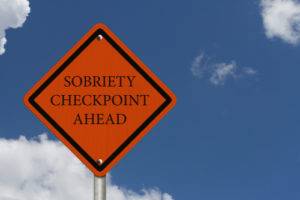Legally Reviewed By:
Brian P. Gabriel, Esquire

Most people are familiar with the concept of DUI checkpoints, and many may have even encountered one during a busy holiday like the Fourth of July or Thanksgiving week. DUI checkpoints are usually planned at times when law enforcement officials expect a spike in drunk driving incidents, so they set them up on busy sections of key roads and provide the public with little to no notice. Anyone who gets trapped into a checkpoint is investigated for DUI, regardless of whether or not they show signs of impairment.
Not everyone agrees with DUI checkpoints, but they are legal in Florida. The next time you approach one, go into it with an understanding of your rights and avoid giving officers more information than they need. If you’re arrested for DUI at a checkpoint, you can work with an experienced lawyer to challenge the arresting officers’ actions and fight to have your charge reduced or dismissed.
What Rights Do I Have at a DUI Checkpoint in Florida?
Police officers at DUI checkpoints will ask questions to gauge your sobriety from the answers you give and your behavior. If your behavior and answers raise suspicion, that will then provide the officer with probable cause for a lengthier investigation.
The Right to Refuse to Answer Questions
You should know that you’re not obligated to respond to a police officer’s questions at a DUI checkpoint. Not long ago, news circulated that some Floridians were choosing to roll up their windows at DUI checkpoints to avoid all contact with police officers. Although you’re not required to talk to police, this may be an overreaction. Generally, it’s acceptable to provide answers to the most basic questions confirming your identity. You may politely decline answering further questions until you consult with an attorney.
The Right to Leave a DUI Checkpoint if You’re Not Detained
You have the right to leave the checkpoint if you’re not being arrested or detained. You may politely ask the officer if you’re free to go.
The Right to Refuse Field Sobriety Tests
If you do respond to all of the officer’s questions and he believes you may be impaired, the officer may then ask you to perform field sobriety tests. He or she might neglect to inform you of your right to refuse these tests. If the officer asks you to do the horizontal gaze nystagmus, walk and turn, or the one-leg stand, you may legally refuse them. These tests may provide probable cause for an arrest, and are easy to fail, even when you’re sober.
Can I Legally Refuse A Breath or Blood Test at a DUI Checkpoint?
Due to Florida implied consent laws, you may not refuse chemical tests that measure your blood alcohol content (BAC) even if you roll into a DUI checkpoint. Refusing a DUI breathalyzer or blood test will lead to a one-year license suspension. If you’re arrested for DUI, your lawyer will need to challenge additional charges if you refused mandated chemical tests before your arrest.
DUI Checkpoint Lawyer in West Palm Beach with Over 30 years of Experience
If you’re arrested for DUI in West Palm Beach, reach out to the Law Office of Gabriel & Gabriel for quality counsel and guidance. Attorney Brian P. Gabriel’s extensive experience and dedication to providing personalized attention will help you overcome your DUI charge with the best possible results. Call (561) 622-5575 for a free consultation or complete a contact form to find out how he can help your case.



